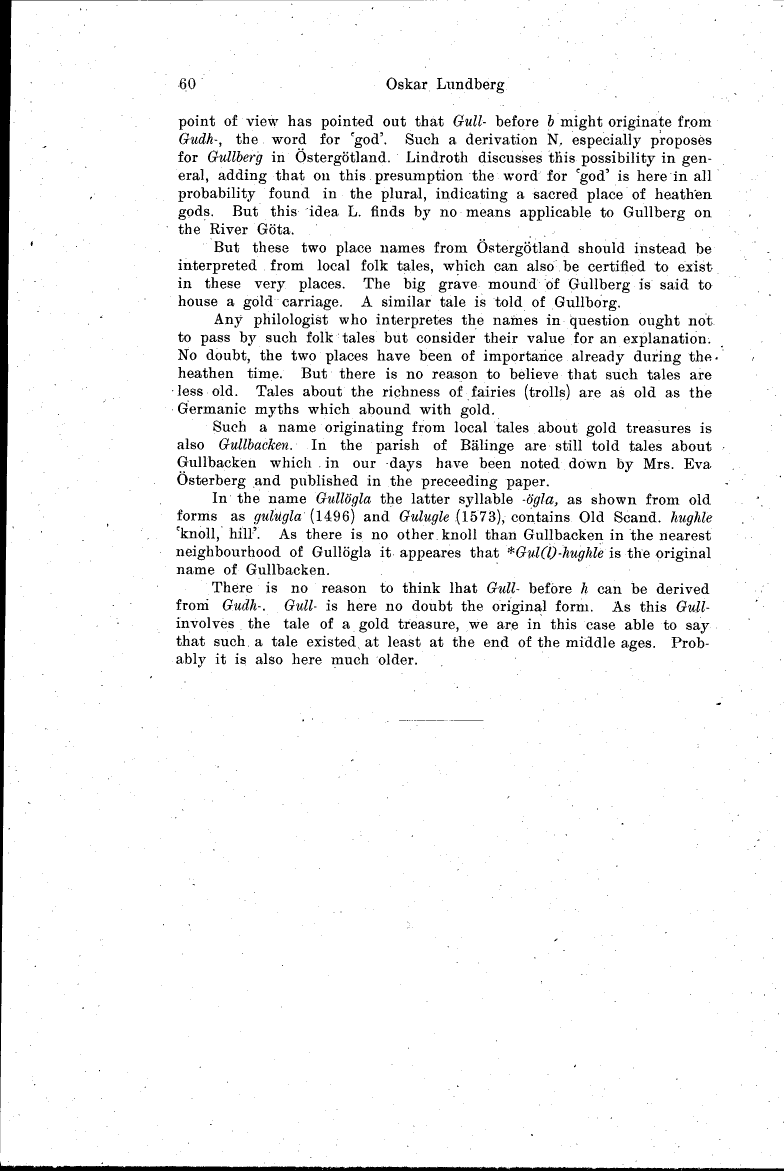
Full resolution (TIFF) - On this page / på denna sida - Sidor ...

<< prev. page << föreg. sida << >> nästa sida >> next page >>
Below is the raw OCR text
from the above scanned image.
Do you see an error? Proofread the page now!
Här nedan syns maskintolkade texten från faksimilbilden ovan.
Ser du något fel? Korrekturläs sidan nu!
This page has never been proofread. / Denna sida har aldrig korrekturlästs.
60
Oskar Lundberg
point of view has pointed out that Gull- before b might originate from
Gudh-, the word for cgod\ Such a derivation N, especially proposès
for Gullberg in Östergötland. Lindroth discusses this possibility in
general, adding that on this presumption the word for cgod’ is here in all.
probability folind in the plural, indicating a sacred place of heathen
gods. But this idea L. flnds by no means applicable to Gullberg on
the River Göta.
But these two place names from Östergötland should instead be
interpreted from local folk tales, which can also be certified to exist
in these very places. The big grave mound of Gullberg is said to
house a gold carriage. A similar tale is told of Gullborg.
Any philologist who interpretes the names in question ought not
to pass by such folk tales but consider their value for an explanation.
No doubt, the two places have been of importance already during the
heathen time. But there is no reason to believe that such tales are
less old. Tales about the richness of fairies (trolls) are as old as the
Germanic myths which abound with gold.
Such a narne originating from local tales about gold treasures is
also Gullbacken. In the parish of Bälinge are still told tales about
Gullbacken which in our days have been noted down by Mrs. Eva
Österberg and published in the preceeding paper.
In the name Gullögla the latter syllable -ögla, as shown from old
forms as gulugla (1496) and Gulugle (1573), contains Old Scand. hughle
cknoll, hill’. As there is no other knoll than Gullbacken in the nearest
neighbourhood of Gullögla it appeares that *Gul(l)-hughle is the original
name of Gullbacken.
There is no reason to think lhat Gull- before h can be derived
from Gudh-. Gull- is here no doubt the original form. As this
Gull-involves the tale of a gold treasure, we are in this case able to say
that such. a tale existed. at least at the end of the middle ages.
Prob-ably it is also here much older.
<< prev. page << föreg. sida << >> nästa sida >> next page >>